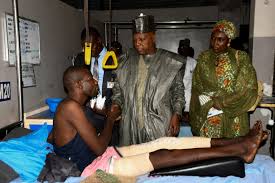In Nigeria, a series of deadly blasts thought to have been carried out by female suicide bombers has killed more than 30 people, according to the vice-president. Kashim Shetim visited the hospital in Maiduguri, the capital of Borno State, on yesterday (July 1) and said there were 42 people injured, AFP reported.
Female suicide bombers targeted three locations in a Nigerian Town. The incidents occurred in Borno state, an area deeply affected by the Boko Haram insurgency, which began in 2009.
Coordinated Attacks
The horror unfolded on Saturday with brutal, co-ordinated attacks targeting a wedding, the victims’ subsequent funeral, and a hospital in the town of Gwoza, near the Cameroon border. The community is in shock and mourning.
President Bola Tinubu condemned the attacks, calling them “desperate acts of terror.” He promised firm action against those responsible and emphasized that the attacks had not undermined recent progress against jihadists.
“The president declares that the purveyors of wanton violence shall have a certain encounter with justice, and that these cowardly attacks are only but an isolated episode as his government will not allow the nation to slither into an era of fear, tears, sorrow, and blood,” a statement from his spokesperson said on Facebook.
Although no group has claimed responsibility, the Islamic State West Africa Province (ISWAP) insurgents, who have previously carried out deadly bombings in Borno, are suspected.
The injuries range from abdominal ruptures to skull and limb fractures. In response to the attacks, the military has imposed a curfew.
The first explosion rocked a wedding celebration in the town of Gwoza, according to Barkindo Saidu, director-general of Borno State Emergency Management Agency. Shortly after, another blast occurred near a General Hospital, followed by a third at a funeral where the bomber posed as a mourner. Tragically, children and pregnant women were among those killed, with over 30 others wounded, sustaining severe injuries like abdominal ruptures and skull fractures.
Suspicion on Boko Haram
No group immediately claimed responsibility for the attacks, but suspicions point towards Boko Haram, notorious for using women and girls in suicide bombings. The group has a history of kidnapping thousands, including schoolchildren, for such purposes.
President Bola Tinubu condemned the attacks as “desperate acts of terror” and assured that they were an isolated incident. However, the resurgence of suicide bombings has raised concerns about regional security. Authorities have enforced a curfew in response to the attacks, underscoring the ongoing threat posed by Boko Haram, which aims to establish an Islamic state in Nigeria.
The insurgency has not only claimed over 35,000 lives but also displaced millions, exacerbating a humanitarian crisis across the region. The situation remains critical as armed groups continue to engage in kidnapping for profit and territorial control, impacting communities across Nigeria.
The town of Gwoza, near Chibok where the infamous abduction of 276 schoolgirls occurred in 2014, remains particularly vulnerable. Nearly a hundred of those girls are still missing, highlighting the ongoing challenges faced by authorities in tackling terrorism and securing the safety of civilians in Nigeria.



